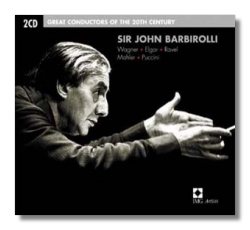
The Internet's Premier Classical Music Source
Related Links
- Latest Reviews
- More Reviews
-
By Composer
-
Collections
DVD & Blu-ray
Books
Concert Reviews
Articles/Interviews
Software
Audio
Search Amazon
Recommended Links
Site News
 CD Review
CD Review
Great Conductors of the 20th Century

John Barbirolli
- Richard Wagner: Die Meistersinger: Prélude to Act I 1
- Edward Elgar: Enigma Variations 2
- Maurice Ravel: Ma mère l'Oye 2
- Gustav Mahler: Symphony #2 "Resurrection" 3
- Giacomo Puccini: Madama Butterfly: Conclusion of Act I 4
3 Helen Donath, Birgit Finnlia
4 Renata Scotto, Carlo Bergonzi
1 London Symphony Orchestra/John Barbirolli (1969)
2 Hallé Orchestra/John Barbirolli (1956 & 57)
3 Radio-Sinfonieorchester Stuttgart/John Barbirolli (1970)
4 Orchestra del Teatro dell'Opera di Roma/John Barbirolli (1966)
EMI 75100 2CDs
I once talked with Sylvan Levin. Sylvan was an associate conductor under Stokowski when in Philadelphia. Sylvan was the pianist who gave the U.S. première of Ravel's piano concerto under Stokowski. Later Sylvan went on to New York to work but the two often spent time together when Stokowski moved there. Sylvan told me of an evening when they went to a social party after a concert. The guests were dishing the evening's conductor, who happened to be Barbirolli. Stokowski turned to Sylvan and said, "Let's leave, there are no music lovers here."
This set is part of the first installment of what will be several 2-disc sets from EMI. One featuring Stokowski will be released overseas in August or September of this year. EMI has licensed material from sources other than their archives. As a result we can now hear the Mahler 2nd under Barbirolli, meaning that except for #8 (which I don't now if he performed) we can hear Sir John in all of the Mahler symphonies in either commercial recordings or public performances now on BBC Classics!
The Wagner is majestic, powerful; it is close to Stokowski's London Symphony performance (on London Phase 4). Barbirolli's strings are not as prominent as Stokowski's (whose strings swirl around like some force of nature) but it is a damn good interpretation. For some reason I began to think about Herbert Von Karajan as I was listening to this Meistersinger. I pulled out his performance of the Prélude that opens his recording of the opera (on EMI) Von Karajan is almost two minutes faster than Barbirolli and that undermines the impact. It was not dull, but Barbirolli's is more majestic, nobler, and more emotional. Von Karajan has always struck me as an artist who was always good in a distant-sort-of-way. His Sibelius 4th, for example, is chilly like someone looking over the bleak landscape of Finland from inside a cabin in a club. It is all very picaresque but it doesn't bring me into the landscape as fully as Barbirolli, to mention just one. The same is true here as well.
When it comes to the Enigma Variations Boult and Barbirolli are often mentioned in the same breath. Frankly I have always found Boult to be too "stiff upper lip" (an American phrase by the way). Barbirolli, however, is full of passion in this music. I have three of his four recordings now, thanks to this release. Out of curiosity I listened to all three focusing on Nimrod (my favorite variation). My notes indicate that the recordings differ in that 1947 is passionate, 1956 (here) is mournful and subtler, and by 1963 Sir John's interpretation had grown to be world weary and wise. Now, this is where you realize that words cannot fully tell you about the music unless you use emotional words rather than the technical data. If you listen, however, I think you will understand why I selected those terms.
The Ravel surprised me. I had not thought of Sir John as an impressionist conductor. However, he is right up there with Stokowski, if not quite as colorful. The opening music creeps in on little cat feet, to coin a phrase. You sense it before you hear it. I frankly didn't even think of taking notes because I was so involved in the music.
The Mahler "Resurrection" is among the finest recordings I know. I would rank it with Klemperer and Stokowski. From the opening I was sucked into the music. The close of movement one keeps you suspended like a cliffhanger. The rest is no less riveting. Every emotion in the score is brought to fruition. The strings sing, the bass line is wonderful, the brass are perfect. The notes reveal that Barbirolli "reckoned that mastering a Mahler symphony took between 18 months and two years, and he would spend hours meticulously bowing all the strings in preparation for his performance." The live performance here does not indicate any micromanaging and I am sure Sir John learned a lot in the 32 performances he made of this music. The one included here was his last, made only 3 months before his death.
The Puccini excerpts are from the commercial recording of the whole opera and I found them as involving as everything else on this set. The complete opera is not currently available but you can hope to see it on the GROC series. Fortunately I already have a copy.
I spent many pleasant evenings enjoying these discs. They not only commemorate a great conductor, they offer pleasure and insights to the music.
Copyright © 2002, Robert Stumpf II


















